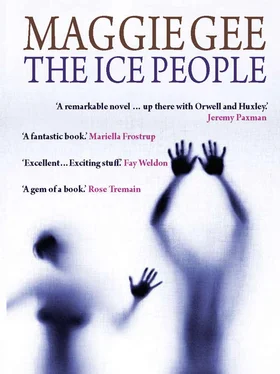‘You won’t help me,’ she remarked, tightlipped. ‘You make me feel bad about asking you to help. So don’t pretend to be all concerned.’
She wasn’t logical, because she was tired, always hyperactive, living on her nerves. She found it hard to say ‘No’ to things. Each invitation to write an article, appear on the screens or speak at a conference might be her last, so she never refused. She put her work before everything — she was always exhausted. Perhaps that was why … Stress can make human beings infertile.
(But was I so different? No, just less successful.)
When my parents came, they were amazed and frightened. The way Sarah’s phone never stopped ringing, the gourmet food at every meal (when most people in England lived on pills and Fibamix), the huge china bowls that Sarah kept filled with expensive real flowers in the diner and the screenroom, the way we darted around, without a second thought, in taxis and, slightly less often, minicopters (my mother had only taken two taxis in her life, and neither of my parents had flown in a minicopter until we hired one to take us all to a West End lloydwebber, then supper at the Ritz), the way we worked into the early hours, and lived symbiotically with our machines, which responded to our voices, of course, opening doors, cooling, heating, dealing with rubbish, ordering food. It was a different world from Samuel and Milly’s.
‘It’s very nice, Saul,’ my mother hissed the first time they came to Melville Road, as soon as Sarah had vanished to the kitchen. Mum liked our cats. Two fluffy white Persians. Not practical, really, with the heat. They were neutered males; we couldn’t have coped with kittens. They sat and flicked their thick feathery tails as they watched the flies outside the window. ‘We couldn’t have cats, with your father’s birds … You’ve done so well. The flat. Sarah. Your dad and I — we never quite managed …’ She trailed away, not wanting to say more. ‘But you, the kids. It’s what we wanted for you.’
So we were doing something right. My parents loved us, our employers loved us; our friends came round and were hard to dislodge after Sarah’s brilliant salads and my chilled wine; minicopters and cleaners enjoyed our tips; the Liblabs courted our donations, especially in election years, and sent us invitations to celebrity events … In this life we were flying high.
But we had another life that was a secret minefield of rings on calendars, hopes and fears. ‘We’ll do it,’ I told her, finding her in tears after another period turned up to disappoint her.
‘We have to have help.’
‘No, you have to have faith.’
So when did I start to accept there was a problem? I found it harder to face up to than Sarah. Harder, perhaps, for a man to admit he can’t do the thing his body should do. As if that function defines a man.
I blamed myself. I had been so certain I could give Sarah what she wanted.
And more than a family was hanging on this. Sarah had promised to marry me, once, long ago, in our first few months together. Marrying was rare in the Tropical Time (though it came back later, with the Troubles and the Ice.) In the twenties and thirties, only godlovers got married, plus a few old slows afraid of the future.
But I loved Sarah, and feared to lose her. And I wanted to have what my parents had had. It probably all looked different to Sarah, whose parents split up before she was eight. She was flattered to be asked; it was ‘old-fashioned’ and ‘romantic’. Or so she said, but words are easy. Perhaps it simply went well with the self she had invented to go with her job as Role Support Officer, the false new self she so quickly tired of –
I mustn’t get bitter. What good does it do?
As Sarah grew more successful and selfconfident, she didn’t see the point of marrying.
‘It’s a vow, that’s all,’ I tried to explain. ‘Who cares whether other people do it? We’re not like other people, are we?’
‘No,’ said Sarah. ‘I suppose we’re not. But it’s a bit awkward, all the same … The paps will come and photograph us, and afterwards they’ll never leave us alone.’
‘So it’s your immense fame, is it, getting in the way?’
I had to tease her, sometimes, or die, and Sarah usually saw the joke. Not this time, though.
‘It’s political,’ she said, in that overemphatic, selfrighteous voice she used when I was being thick. ‘You never see the political angle.’
‘I thought marriage was personal, actually. It’s about you and me, and — love and children …’
‘Well, of course I’ll marry you if — I mean, I’ll marry you when we have children.’
So that was settled. A compromise that neither of us was quite happy with, but I held it before me like a baton through the tenyear marathon we ran to conception.
Two years in, I agreed to have tests. Sarah was the realist. I didn’t want to do it — to join the thousands of anxious couples who flocked to the Batteries every day.
‘I didn’t mention the Batteries,’ Sarah protested. ‘I hate that name, in any case … The fertility clinics do their best for people.’
‘Eggboxes then.’
‘That’s stupid too. We just have to ask our own doctor for a few little tests to see what’s happening.’
It turned out she was already wellinformed. She had discussed it all with her friend Sylvie, who’d had a successful techfix conception. I was very upset she had discussed it. I didn’t like Sylvie, a thin intense woman with too much makeup and strawlike hair. Her threeyearold son was out of control, and she talked on the telephone to Sarah for hours. To me she always looked slightly dirty.
But then I was ignorant, truculent, proud, and wanted no one to know our problems.
I grew humbler later. God, I did. I have tried to forget the humiliations.
I gave them my sperm to be examined.
I felt I was giving them my dreams.
Of course, as the doctor told us, in his lying, caring, professional voice, no tests were onehundredpercent conclusive, and there were many things medicine still didn’t know …
I was angry, and hurt. Sarah claimed I exploded. ‘Oh, you don’t know it all, then?’ I sneered at him. I tore his form in two, then in four. ‘Do you think that’s a surprise to anyone? Science knows fuck all about making babies —’
‘He’s upset,’ said Sarah, preemptively. ‘I’m sorry, Dr Um — I can never remember your name. Sorry.’
‘Wang. Dr Wang —’ (I laughed, rudely) ‘we quite understand these are stressful experiences.’
Dr Wang ‘understood’ — but no one understood. I had just been told my sperm was semifertile. My balls were no good, that was what I heard. They were big and firm, I had trusted them, I’d secretly believed the problem was Sarah’s –
I halfexpected her to leave me.
She didn’t, though. She comforted me, back in the privacy of home. At least, she tried to comfort me. ‘It’s normal, now, you realise. The majority of men have semifertile sperm. At least you were brave enough to get tested. Most men won’t, which is simply pathetic.’
‘Pathetic?’ I said. ‘You haven’t a clue. You don’t understand how much it means to men … everything, really.’
‘You’ve still got me. And your job. And your future. And we’ll still have a baby, somehow, sometime. Other people do. So shall we.’ She was brisk and kindly, but thought my grief excessive. She always did think me too extreme –
Yet wasn’t that part of what she’d fallen in love with, my passionate emotions, my grandiose self? The Saul who was ready to die for her when the spacemen appeared with their huge silver vappers? She was inconsistent, like all women.
Читать дальше












